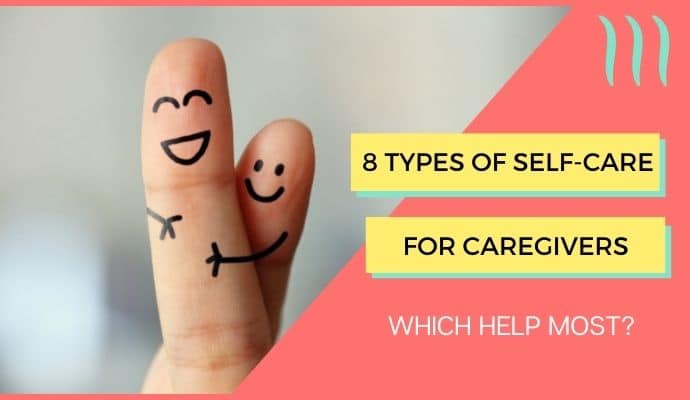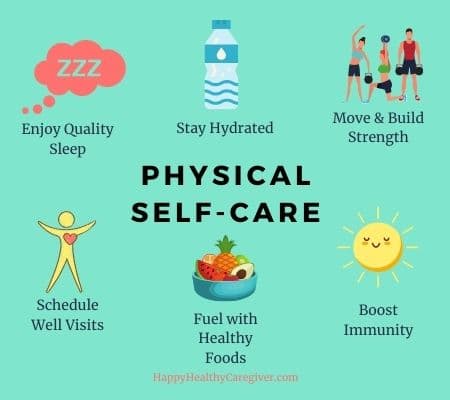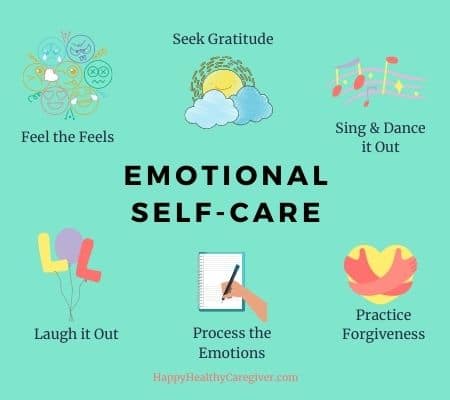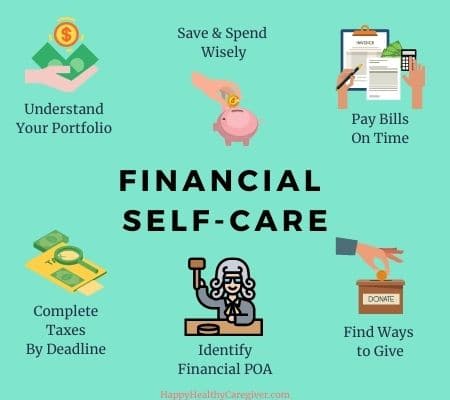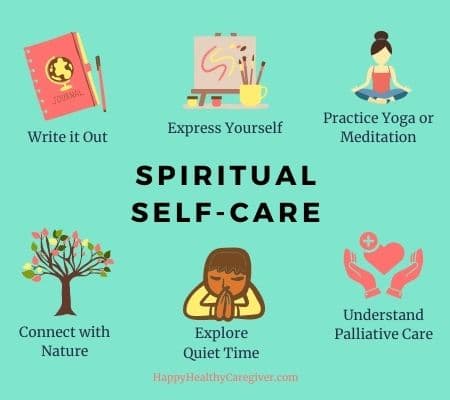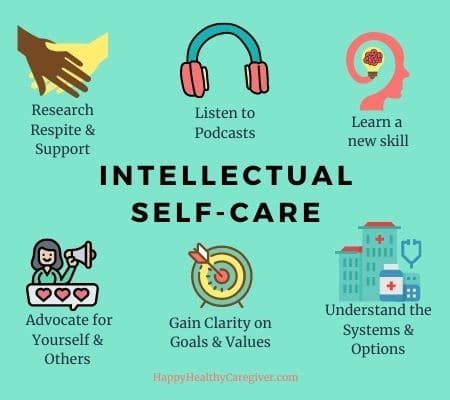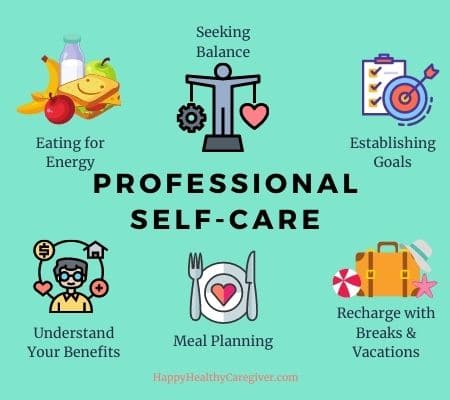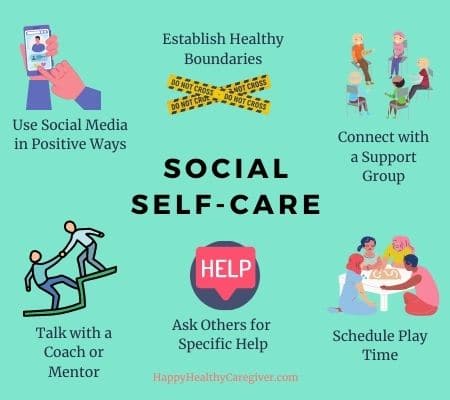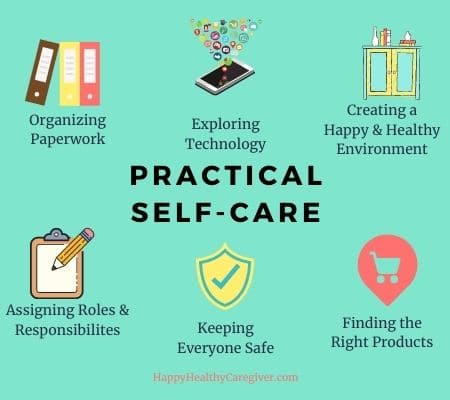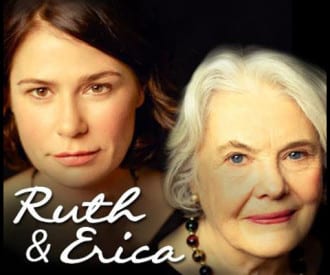When I started caregiving for my parents and helping my husband care for his mom, the necessity of taking time to care for myself hit me like a ton of bricks.
The three individuals we were caring for all had serious chronic medical conditions that were caused by their poor lifestyle choices.
I knew that if I didn’t start prioritizing my own health and happiness, I risked putting my own two children in a similar caregiving situation in the future.
Getting on track through Happy Healthy Caregiver
To help me put my life back on the self-care track while caring for others, I created Happy Healthy Caregiver in 2015.
Even though I knew that self-care was necessary, when I think back to that time, I can see now that I was laser focused on physical self-care.
Healthy nutrition and exercise consumed my blog and social media posts. I didn’t even consider sleep quality a critical factor in my self-care until months later.
What has remained true is that I have always considered self-care to be more than just a night out, weekends away, or a day at the spa. These activities feel great, but are frankly too far and few between, especially for family caregivers.
I needed to find little ways in my day to rest and regroup.
While caregiving, I started trying activities that others said helped them feel more at peace or energized.
This exploratory process has served as content for many Happy Healthy Caregiver articles and podcast episodes.
Curiosity may kill a cat, but it can undoubtedly help sustain a family caregiver.
Over the years I’ve spent as a family caregiver and a Certified Caregiving Consultant, I have discovered that self-care for family caregivers falls into the following eight categories.
1. Physical
We only have one body to use for a whole lifetime.
If we were given one car for our entire life, I am confident we’d keep it up to date on all its oil changes, tire rotations, and car washes.
We’d park it out of the sun, avoid overusing it, and fix parts that break right away. We might not even let people eat junk food in it.
Just like car maintenance, physical self-care is also essential.
Our bodies work their best when we stay active, fuel our bodies with good nutrition, and get quality sleep.
For example, bring a reusable water bottle wherever you go and stash a healthy protein bar for an on the go nutrition option.
2. Emotional
Saying “I’m fine” when someone asks how you are is not a feeling. Emotional self-care is about identifying how you truly feel and then processing those emotions.
Practicing emotional self-care involves respecting boundaries, forgiving others, seeking laughter, being vulnerable, having self-compassion, and allowing yourself to feel grief.
For example, when your care recipient is repetitive about past mistakes, calmly let them know that this conversation is no longer productive and you will no longer remain present for conversations on this topic.
Or, if your care recipient has a cognitive disability and this explanation is not helpful, redirect them to another subject or activity to end that conversation topic.
3. Financial
Most of us aim to be as independent for as long as we can. We first think about physical independence and our activities of daily living, but financial security also factors into this equation.
Financial self-care is about developing spending and saving habits that will set you and your family up for future financial success.
Paying bills on time, periodically reviewing your portfolio, and identifying a financial Power of Attorney are all examples of financial self-care.
For example, schedule a bi-annual meeting with either the financial planner or the family member responsible for money matters to review income and expenses and proactively discuss what financial decisions are needed.
Invite all financial power of attorney decision makers and the care recipient (unless they are cognitively unable to participate).
4. Spiritual
Spiritual self-care is about infusing your personal beliefs and values into your life.
Some examples of spiritual self-care for caregivers include: soaking up nature, practicing mindfulness, incorporating prayer, journaling, enjoying solitude, talking about end-of-life wishes, expressing gratitude, and attending a retreat.
For example, during my caregiving journey, I found writing to be an effective way to process how my world was changing. I wanted to share this experience with other family caregivers.
I wrote the Just For You: a Daily Self-Care Journal to provide other caregivers with an easy and fun tool to make self-care a daily habit and help regain their sense of self.
5. Intellectual
Life would be boring if we weren’t continually learning. Intellectual self-care helps us grow and keeps life interesting.
Some examples include: enriching our minds with books and documentaries, broadening our skills, and trying new things.
For example, caregiving was an overwhelming and brand new topic for me. I had to learn new skills, understand new vocabulary, and research options.
For me, podcasts became a platform I replied upon. I could search for the topic and obtain the training I needed at a particular moment while driving to work or taking a walk.
In 2017, I launched the Happy Healthy Caregiver podcast. This podcast spotlights real family caregivers sharing how to be happy and healthy while caring for others.
Each of the hundred-plus episodes of the Happy Healthy Caregiver podcast include tried-and-true coping strategies, practical systems, and self-care strategies.
6. Professional
Burnout from our careers is a familiar concept, and burnout from caregiving is very similar.
Professional self-care is about sharing your strengths and gifts with the world. It’s also about defining boundaries and developing strategies to minimize stress, so you live a well-rounded life and avoid burnout.
If you are a working caregiver, scheduling times for rest is also a component of self-care. There are no awards for not using your lunch breaks or your vacation time.
Using your employee benefits can help you recharge. Many companies offer Employee Assistance Programs offering counseling and dependent services.
For example, when my husband and I were squeezed in the sandwich generation, we discussed a system that worked best for us – a dual working family.
There were so many different calendars for school, sports, work travel, wellness appointments, and our family events. So, we created one digital family calendar and committed to putting everything on it right away.
This system helped us collaborate better and gave us confidence that we were exactly where we needed to be.
7. Social
We are all capable of hard things, but we don’t have to do them alone. Social self-care is about surrounding yourself with people you trust who will support and lift you.
It’s about spending time with those who are important to you and having FUN! For caregivers, this is also about creating your care team and asking for specific help.
Support for family caregivers can come from traditional caregiver support groups, like one of the Daughterhood Circles.
Group support may also come from your golf club, writing group, or book club. Some companies offer affinity or employee resources groups specifically for caregivers.
Social self-care is also available through 1-on-1 caregiving coaching sessions and Facebook Groups like Self Care Support for Caregivers.
For example, at first, I felt so isolated as a family caregiver. None of my friends were going through a similar situation and I needed to talk to people who understood and could give me sound advice.
Then I saw a flyer at my mom’s assisted living community about a support group meeting for families. During this one hour meeting, I felt supported and gained valuable tools about boundary setting with my mom. I also learned about other helpful resources for caregivers in my community.
8. Practical
Sometimes self-care is getting your essential paperwork together.
Other practical self-care activities that result in peace of mind include: keeping our loved ones safe, advocating for ourselves, finding ways to make caregiving sustainable, and making our home cozy and stress-free.
For example, my sister created two binders for my mom. One for her financial information and one for her health information.
Each binder was easy to take to related appointments and to reference during calls when questions came up. This sustainable system saved us time and provided peace of mind.
Customize your self-care for your specific needs
Self-care is not a one size fits all activity. Like each of us has our taste in cars, we can have our personal preferences on what satisfies our self-care hunger.
Test drive a few ideas from these eight categories and take note of what makes you feel like rolling down the windows and cranking up the tunes.
By Elizabeth Miller, Happy Healthy Caregiver
Happy Healthy Caregiver, LLC is a lifestyle website, podcast, and consulting business that helps family caregivers integrate self-care and caregiving with their busy life. With the Happy Healthy Caregiver resources and community, caregivers no longer feel isolated and overwhelmed but instead armed with the tools and support they need to prioritize and optimize their health. Happy Healthy Caregiver was founded in 2015 by Elizabeth Miller. Elizabeth is a family caregiver advocate, speaker, author, and Certified Caregiving Consultant. For more information, visit happyhealthycaregiver.com and follow @happyhealthycaregiver on Instagram.
This article is sponsored by Happy Healthy Caregiver. For more information, see How We Make Money.
[optin-monster slug=”yxbytm35zhsdfopnw7qk”][optin-monster slug=”jvhyplxmb4umsjazxecn”]
About the Author

Connie Chow
Connie was a hands-on caregiver for her grandmother for 20 years. (Grandma made it to 101 years old!) She knows how challenging, overwhelming, and all-consuming caring for an older adult can be. She also knows how important support is — especially in the form of practical solutions, valuable resources, and self-care tips.

